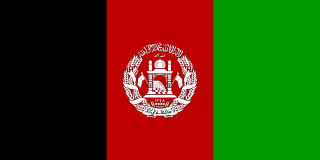
The Asian Games, also known as Asiad, is a continental multi-sport event held every fourth year among athletes from all over Asia. The Games were regulated by the Asian Games Federation (AGF) from the first Games in New Delhi, India, until the 1978 Games. Since the 1982 Games, they have been organized by the Olympic Council of Asia (OCA), after the breakup of the Asian Games Federation. The Games are recognized by the International Olympic Committee (IOC) and are described as the second largest multi-sport event after the Olympic Games.

The South Korea national football team represents South Korea in men's international football and is governed by the Korea Football Association. South Korea has emerged as a major football power in Asia since the 1980s, having participated in ten consecutive and eleven overall FIFA World Cup tournaments, the most for any Asian country. Despite initially going through five World Cup tournaments without winning a match, South Korea became the first Asian team to reach the semi-finals when they co-hosted the 2002 tournament with Japan. South Korea also won two AFC Asian Cup titles, and finished as runners-up on four occasions. Furthermore, the team won three gold medals and three silver medals at the senior Asian Games.

The 2002 Asian Games, officially known as the XIV Asian Games and also known as Busan 2002, were an international multi-sport event held in Busan, South Korea from September 29 to October 14, 2002, with the football event commenced 2 days before the opening ceremony.

The Jordan national football team represents Jordan in international football and is controlled by the Jordan Football Association. Jordan have never qualified for the World Cup finals but have appeared four times in the Asian Cup and reached its quarter-final stage in the 2004 and 2011 editions.

The Philippines men's national basketball team, commonly known as Gilas Pilipinas, is the basketball team representing the Philippines. The team is managed by the Samahang Basketbol ng Pilipinas.

Singaporeans participate in a wide variety of sports for recreation as well as for competition. Popular sports include football, swimming, track and field, basketball, rugby union, badminton, table tennis, and cycling. Many public residential areas provide amenities like swimming pools, outdoor spaces and indoor sport centres, with facilities for badminton, table tennis, squash among others.

Busan Asiad Main Stadium is a multi-purpose stadium in Busan, South Korea, that was built for the 2002 Asian Games and was also used for matches at the 2002 FIFA World Cup. It has a capacity of 53,769. The stadium hosted the opening and closing ceremonies of the 2002 Asian Games and was also the venue of athletics events during the games. It is the home venue of the K League club Busan IPark.

Iran national under-23 football team, also known as Iran U-23 or Iran Olympic Team; represents Iran in international football competitions in Olympic Games, Asian Games and AFC U-22 Asian Cup, as well as any other under-23 international football tournaments. It is controlled by the Iran Football Federation.
The men's football tournament has been a regular Asian Games sporting event since the 1951 edition, while the women's tournament began in 1990.
Badminton was contested at the 2002 Asian Games at the Gangseo Gymnasium in Busan, South Korea from 6 October to 14 October 2002

Iran participated in the 2002 Asian Games held in the city of Busan. This country is ranked 10th with 8 gold medals in this edition of the Asiad.
This article contains an overview of the sport of athletics, including track and field, cross country and road running, in the year 2002.

The Indian women's national field hockey team represents India in international field hockey, and is governed by Hockey India. Nabhvarna are currently ranked 6th in the FIH World Rankings, and are ranked as the best team in Asia. They have won the gold medals at the 2002 Commonwealth Games and 1982 Asian Games. They have also won the Women's Asia Cup twice, i.e. in 2004 and 2017. They also won the Asian Champions Trophy in 2016.
The FESPIC Games or the Far East and South Pacific Games for the Disabled, was a multi-sport event in Asia and the South Pacific region which is considered to be a precursor to the Asian Para Games, as two of its edition games in 1999 (7th) and 2002 (8th) were held parallel to the 1998 Asian Games and the 2002 Asian Games.

The India national kabaddi team represents India in international men's kabaddi competitions. The team is by far the most successful national kabaddi side of any country, winning gold medals at the Asian Games in 1990, 1994, 1998, 2002, 2006, 2010, and 2014, as well as winning all three Kabaddi World Cup events to date. Pawan Sehrawat the current captain of the team after Deepak Niwas Hooda was suffering from bad form in PKL 9.

China competed in the 2002 Asian Games held in Busan, South Korea from September 29, 2002 to October 14, 2002.

The India national under-23 football team represents India in international under-23 football and is controlled by the All India Football Federation (AIFF). A member of the Asian Football Confederation (AFC), the team is eligible to compete in the Summer Olympic Games, the AFC U-23 Asian Cup, and the Asian Games, subject to qualification.

India competed at the 2002 Asian Games held in Busan, South Korea. India was ranked 8th with 10 gold medals. Sunita Rani's gold and bronze medals, which she won in the women's 1,500 m and 5,000 m was reinstated after she appealed in the dope scam. India moved up to the seventh spot from the previous eighth spot in the medals table.

South Korea was the host nation of the 2002 Asian Games held in Busan from September 29 to October 14, 2002. South Korea was represented by the Korean Olympic Committee, and the South Korean delegation was the largest in this edition of the Asian Games. The delegation of 1,008 people included 770 competitors – 460 men, 310 women – and 238 officials. North Korea competed for the first time in an international sporting event hosted by South Korea. Both nations marched together at the opening ceremony with a Korean Unification Flag depicting the Korean Peninsula as United Korea.

Afghanistan participated in the 2002 Asian Games held in Busan, South Korea, from September 29 to October 14, 2002. This marked Afghanistan's return to international sporting events after the fall of the Taliban regime. The Afghan delegation consisted of 12 officials and 44 competitors participating in seven different sports. The Afghanistan national football team played its first international match since the 1984 AFC Asian Cup qualification phase. An English teacher from Kabul, Roia Zamani, won a bronze medal in the 72 kg middleweight class of taekwondo without winning a single match. Zamani was the only medalist from the Afghan side and the first Afghan medalist in 20 years. None of the remaining athletes advanced past the qualifying stages, and as such did not win any medals.














